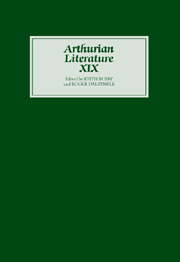Book contents
- Frontmatter
- Contents
- General Editor's Foreword
- I Comedy and Tragedy in Some Arthurian Recognition Scenes
- II Merveilleux et comique dans les romans arthuriens français (XIIe–XVe siècles)
- III La bande dessinée virtuelle du lion d'Yvain: sur le sens de l'humour de Chrétien de Troyes
- IV Convention, Comedy and the Form of La Vengeance Raguidel
- V Le comique dans Les Merveilles de Rigomer et Hunbaut
- VI Humour in the Roman de Silence
- VII La pratique de la ‘disconvenance’ comique dans le Lancelot en prose: les mésaventures amoureuses de Guerrehet
- VIII Lancelot Part 3
- IX Comic Functions of the Parrot as Minstrel in Le Chevalier du Papegau
- X Dinadan en Italie
- XI A Comical Villain: Arthur's Seneschal in a Section of the Middle Dutch Lancelot Compilation
- XII Malory and the English Comic Tradition
- XIII ‘Laughyng and Smylyng’: Comic Modalities in Malory's Tale of Sir Launcelot du Lake
- XIV The Eachtra an Amadáin Mhóir as a Response to the Perceval of Chrétien de Troyes
- CONTENTS OF PREVIOUS VOLUMES
I - Comedy and Tragedy in Some Arthurian Recognition Scenes
Published online by Cambridge University Press: 05 February 2013
- Frontmatter
- Contents
- General Editor's Foreword
- I Comedy and Tragedy in Some Arthurian Recognition Scenes
- II Merveilleux et comique dans les romans arthuriens français (XIIe–XVe siècles)
- III La bande dessinée virtuelle du lion d'Yvain: sur le sens de l'humour de Chrétien de Troyes
- IV Convention, Comedy and the Form of La Vengeance Raguidel
- V Le comique dans Les Merveilles de Rigomer et Hunbaut
- VI Humour in the Roman de Silence
- VII La pratique de la ‘disconvenance’ comique dans le Lancelot en prose: les mésaventures amoureuses de Guerrehet
- VIII Lancelot Part 3
- IX Comic Functions of the Parrot as Minstrel in Le Chevalier du Papegau
- X Dinadan en Italie
- XI A Comical Villain: Arthur's Seneschal in a Section of the Middle Dutch Lancelot Compilation
- XII Malory and the English Comic Tradition
- XIII ‘Laughyng and Smylyng’: Comic Modalities in Malory's Tale of Sir Launcelot du Lake
- XIV The Eachtra an Amadáin Mhóir as a Response to the Perceval of Chrétien de Troyes
- CONTENTS OF PREVIOUS VOLUMES
Summary
Recognition scenes were a staple of classical drama, as Aristotle's famous comments on Oedipus and other plays bear witness. Towards the end of one of Menander's comedies, The Arbitrants, a character remarks ‘And now they have had a recognition scene, and all is well.’ Recognition scenes are also a common feature of Arthurian and other medieval romances and narratives of love and adventure, and often provide comic closure to an episode or to a complete narrative. Sometimes the recognition involves the abandoning of a disguise or pseudonym adopted by the Fair Unknown, but sometimes he himself has been unaware of his own identity and lineage. The suspense is usually less great for the reader than for the fictional characters. Whether or not the narrator has made the truth clear at the beginning of the narrative, the reader, well read in romance motifs, has often seen this revelation coming long before the characters have, and there can be a comic sense of déjà lu. But some of the characters do show an awareness of the narrative patterns associated with the arrival of a Fair Unknown. When La Cote Male Tayle comes to Arthur and asks to be knighted in the Prose Tristan, Lamerok urges the king to grant the request, predicting that he will be a good knight, and comparing him to the young Lancelot: ‘ “Soveigne vos de Lancelot dou Lac, qui est li mieudres chevaliers dou monde, en quel maniere il vint a cort. Vos ne seüstes mie qui il estoit, et totevoies le feïstes vos chevalier. Dites vos or que chevalerie ne soit mie bien emploiee en li?”’
- Type
- Chapter
- Information
- Arthurian Literature XIXComedy in Arthurian Literature, pp. 1 - 16Publisher: Boydell & BrewerPrint publication year: 2002



